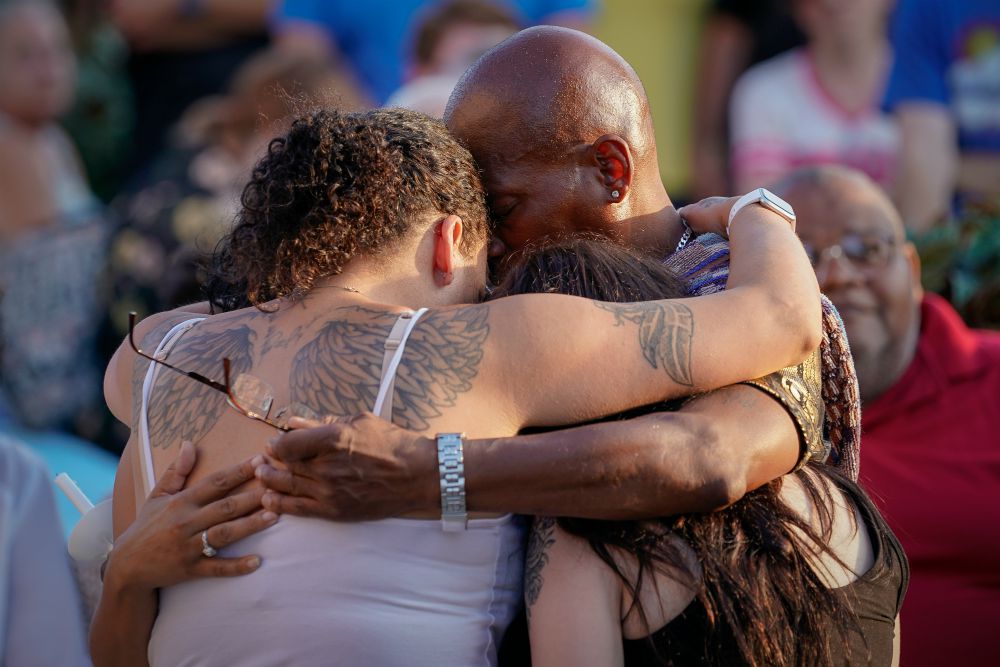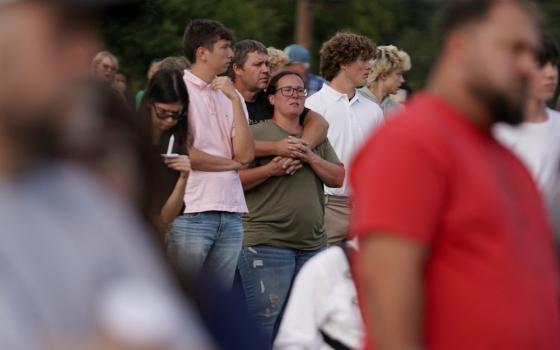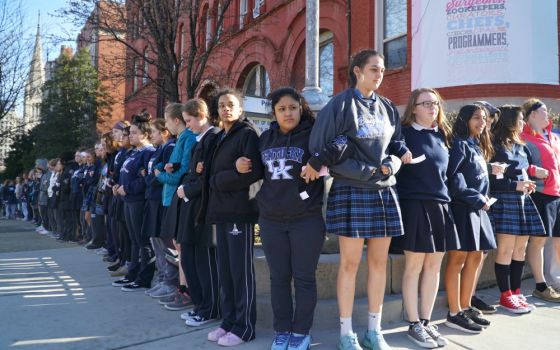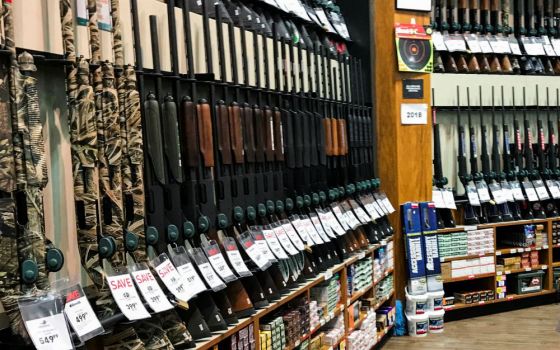
Family and friends of Derek Fudge, who was killed in a mass shooting early Aug. 4 in Dayton, Ohio, embrace during an Aug. 5 memorial service in Springfield. In response to the mass shootings in El Paso, Texas, and Dayton Aug. 3 and 4, several U.S. bishops expressed their support and prayers for victims while also expressing outrage that these tragedies continue to occur. (CNS/Reuters/Bryan Woolston)
President Donald Trump's inauguration included an angry tirade about American urban crime, even as most U.S. cities experienced a sharp drop in murders and violence over the past two decades.
"This American carnage stops right here and stops right now," he said. That was in January 2017.
Now that carnage has returned with a vengeance.
Some argue that Americans are numb to mass shootings since Columbine back in 1999. The onslaught — Las Vegas, Parkland, Gilroy — they say, has begun to merge in our collective heads and lose particular significance.
Some look to generalized moralizing for an explanation. The problem, they say, are video games. Yet Japanese and South Korean young people love video games as much as their American counterparts, but these kinds of attacks rarely happen in either of those countries. Or it's encroaching secularism. But Northern Europe is perhaps the most secular region on Earth, and they rarely suffer such horrors. Or it's mental health. But are Americans really more prone to serious mental disorders than other people?
There is one big difference: Young Americans, almost always male, can find the kind of firepower that expresses deadly rage.
The issue of easy access to weapons of war is a common denominator from Columbine on. But last weekend's American carnage in El Paso, Texas, and Dayton, Ohio, is different. Presidents Bill Clinton, George W. Bush and Barack Obama saw their roles as national preachers of grief and solace in times of crisis. Clinton after Oklahoma City, Bush after 9/11 and Obama after the Charleston church massacre, rose to the occasions with words of comfort in the most eloquent ways that these three men could muster.
This time is different. Never have we experienced political leadership where mass murderers could quote the very rhetoric emanating from the White House to justify their evil.
Ever since Donald Trump and his immigrant wife came down the escalator at Trump Tower to announce his presidential bid in June 2015, the country has been barraged with an onslaught of hate speech emanating from this president.
At that campaign announcement, lest we forget, candidate Trump declared Mexican immigrants as rapists and murderers, with a snarky aside that maybe some are good people. Shall we go on? The litany is too familiar: the calling out for four Congresswomen to go back where they came from. One was born in Cincinnati, which the last time we checked is in the United States; another in the Bronx, not too far from the president's birthplace.
Advertisement
Most grotesquely, when a goon at one of his Florida rallies echoed a lynch mob, calling out that immigrants should be shot, Trump could only make light of the remark. Just weeks later, an angry young man took up that demonic spirit and traveled hundreds of miles to a place where he knew there would be many Mexicans.
That was El Paso. The situation in Dayton remains murkier. Whether that horror will be consigned to the actions of yet another mentally deranged individual, or whether it was part of a wider picture of hatred, has yet to be determined at this writing.
The double dose of atrocity this past weekend was different, particularly what we know about El Paso. When a mass murderer uses the same language as the president, it becomes a moral issue. It is now imperative to call out those who have for too long ignored or defended the indefensible. Those Catholics who have nurtured this evil need to be called to account.
We don't call for forbidding Communion. As Pope Francis says, Eucharist is not a reward for the holy but a help for sinners. But these times call for a massive examination of conscience for those who have fostered this kind of leadership. That includes bishops and priests, as well as lay Catholics, particularly those who are part of this administration, and those churchgoers who feel no shame in these incessant attacks on migrants and others, most of whom are fellow Catholics.
This time is different, and church leaders should recognize it. No more generalizing indictments of society and its excesses. No more lukewarm criticisms of the administration's immigration policies from the bishops' national conference, spelled out in sanitized press releases where the name Trump never appears, as if this peculiar evil is some kind of disembodied mass.
We have a morally bankrupt leader. We will need to find our leaders in other, sometimes unexpected, places.
One such opportunity was at the Football Hall of Fame ceremonies in Canton, Ohio, last weekend. There Champ Bailey, one of the honorees, spoke in a serious tone at what is usually a more jocular jock fest.
"We say this to all of our white friends: When we tell you about our fears, please listen," Bailey said. "When we tell you we are afraid for our kids, please listen. And when we tell you there are many challenges we face because of the color of our skin, please listen."
Listening is a start for all of white America, particularly those churchgoers who for some perverse reason have reveled in the bigotry of this peculiar administration while listening to the message of the Gospel every Sunday. Only then can true repentance follow, offering hope that this American carnage stops right here, and right now.







